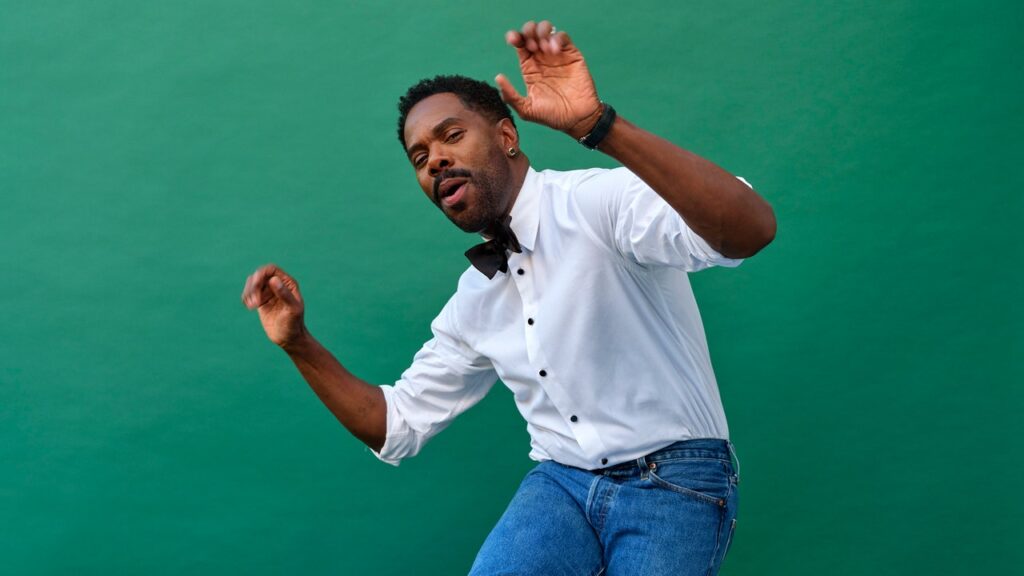The last time I talked to Colman Domingo, in 2021, his life was completely different. At fifty-one, he was a successful character actor, the kind whose face you might recognize from a flashy supporting role on TV—say, a con man turned post-apocalyptic dictator on “Fear the Walking Dead,” or Zendaya’s rehab sponsor on “Euphoria.” After a long career in theatre, appearing in musicals on Broadway and writing and directing Off Broadway, he was popping up in movies—as a pimp in “Zola,” as a creepy laundromat worker in “Candyman”—and on red carpets, where he’d rock a leopard-print or fuchsia suit. But relatively few people knew his name.
Then, in 2022, Domingo won an Emmy, for “Euphoria.” The following year, he had a big, villainous part in the movie musical “The Color Purple” and played the title role in “Rustin,” George C. Wolfe’s bio-pic of the gay civil-rights leader Bayard Rustin. That movie, which had the backing of Netflix and of Barack and Michelle Obama’s outfit Higher Ground, was a high-profile showcase for Domingo’s heart-on-his-sleeve charisma; like Rustin himself, he was finally getting his due. The role earned Domingo an Oscar nomination for Best Actor. Come next weekend, he stands a strong chance of getting a second consecutive nomination in the category, for the A24 drama “Sing Sing.” In other words, Colman Domingo is a movie star now. (In fact, Out called him “the first Black gay movie star,” a title that, with a few possible caveats, is hard to dispute.)
In “Sing Sing,” which returns for a theatrical rerelease this weekend, Domingo plays an innocent man incarcerated at Sing Sing Correctional Facility who has become a leading player in a prison theatrical troupe, part of the nonprofit program Rehabilitation Through the Arts. The film, directed by Greg Kwedar, draws on real life and real people—John (Divine G) Whitfield, the basis for Domingo’s character, is an alumnus of the program, and the cast includes former inmates playing versions of themselves, notably, his co-star Clarence (Divine Eye) Maclin.
Whereas Divine G makes art in constricted circumstances, Domingo has been living an expansive life. When I caught him last month, over Zoom, he was at his home office in Malibu, where he lives with his husband, Raúl. (Fortunately, the house was unharmed by the wildfires.) He’d just come from London, and before that New York, and before that Puerto Rico, where he’d shot the Netflix series “The Four Seasons,” Tina Fey’s remake of the Alan Alda film. “You’re working with, like, the mad scientists of comedy: Tina Fey, Steve Carell, Will Forte,” he said, with trademark exuberance. “And now introducing the new comedy ingénue . . . Colman Domingo!” Next, he was off to a Mexican getaway with Tessa Thompson and Niecy Nash, and then on to the Golden Globes, where he was nominated for “Sing Sing.” (His look: a Valentino mohair-wool tux with a flowing checkered ribbon tie.) At his desk, he wore an A24 cap and sat in front of framed photographs of Paul Newman and James Baldwin. Occasionally, he got distracted by a squirrel or a piece of chocolate, as we walked the long path that brought him from West Philly to late-blooming stardom. Our conversation has been edited and condensed.
When we talked in 2021, I remember not knowing which role to focus on, because you were in four movies at once but not the lead of any of them. Does it feel like your life has completely changed in the past four years?
It has, but I can feel on the inside where it’s been gradual, where I’ve been making strides for a long time. It’s wild. I’ve been working for a good thirty-four years, and I’ve always been forging my own path. One of my early agents said, “You’re a character actor in a leading man’s body, and it’s going to take a while for the industry to understand that you’re actually both.” I always believed that I could lead, but it’s actually very challenging to be a character actor, and that’s where I usually find my joy: in discovery.
But the things that I’ve led, it’s actually because I helped build them. Even “Rustin,” I was a part of building it for four years before it actually happened. And “Sing Sing,” as well. For “Euphoria,” Sam Levenson actually wrote toward me. Directors know my work, writers know my work. They’re like, This guy, he can turn on a dime. He can play a queer civil-rights hero, and then flip and play an abuser in “The Color Purple.” I have this dual thing happening all the time.
I read that you shot “Sing Sing” in the eighteen days between “The Color Purple” and pickups for “Rustin.” What was it like to plunge yourself into this project between two other things that are completely different?
It felt like it had to happen. In anything that I do, if I’m a little nervous and I feel like I might mess it up, that’s where I run toward. Rustin, that’s a seismic role. I was on pretty much every single page of the script. And “The Color Purple,” where I was the male lead—he’s very propulsive, and he changes everyone in the film. And then I have this, where I have to lead with a sense of generosity, to allow people who had never been on a set to do it. But I knew that I was ready for it, because I’ve been ready for thirty-four years. I’ve been the lead of companies in theatres. A lot of things right now are harkening back to my theatre days, things that I’ve been doing that people didn’t know that I’ve been doing. I used to always think, Why do I always have to build it from the ground up? Why can’t things just come to me? But I realize now that that’s part of my journey.
When you say you built “Sing Sing” from the ground up, what did that consist of?
I’ll give you the genesis. My director, Greg Kwedar, and the co-writer, Clint Bentley, had been working at Sing Sing prison as volunteers, and they kept thinking, Wow, if we can make something out of this experience with the Rehabilitation Through the Arts program, it could be profound. They did passes of scripts for a couple years. Six years later, whatever they had they sort of trashed. Then Greg came up with the idea to center on the friendship between these two men, and he thought, Oh, maybe the story’s actually smaller. It’s just about a friendship, while they’re putting on this play and going through their parole-board hearings. He said he wrote my name down on the bottom of the treatment. They reached out to me for a meeting. We had a nice Zoom. I said, “Send me the script.” They said, “We don’t have one. We have an article from Esquire detailing the program.” And I said, “Send me that.” I read it pretty quickly, and I was like, Wow, a program like this exists? And I’m thinking about these beautiful images they had, of these Black and brown men wearing costumes, knowing that they’ve gone through the prison system, and they looked so full of joy.

